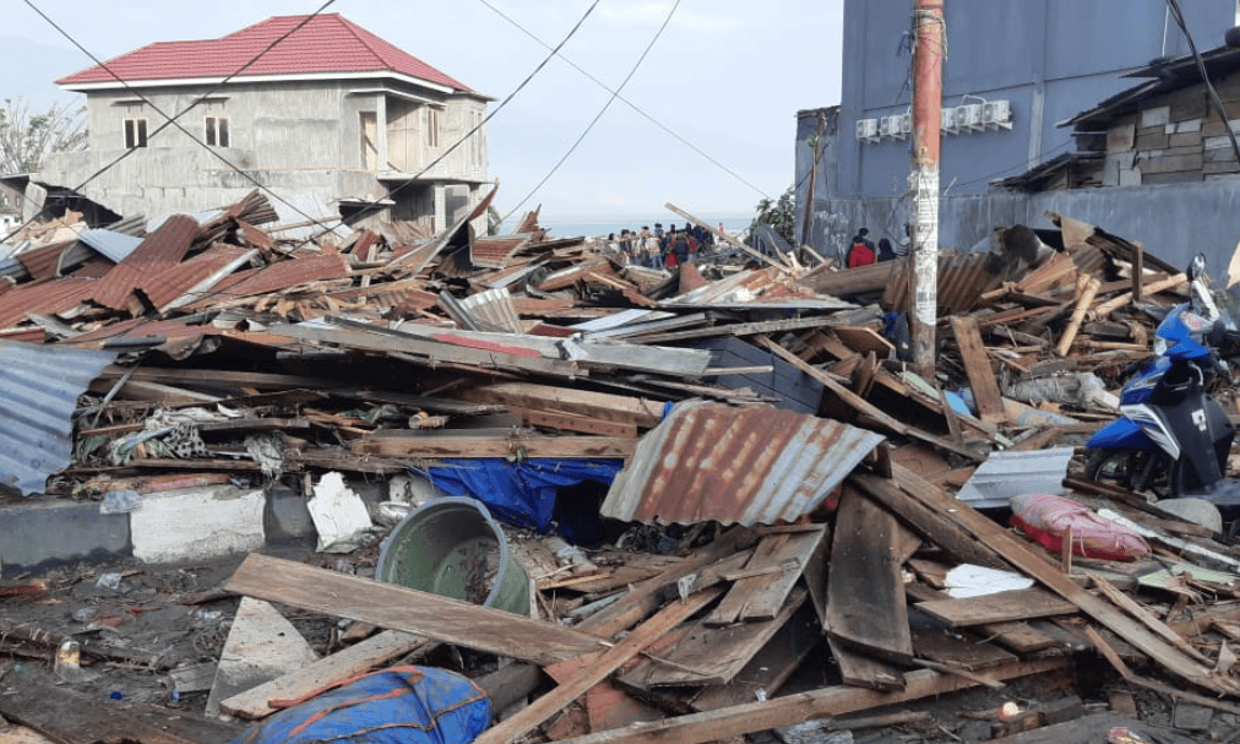
Dozens are feared dead on the Indonesian island of Sulawesi after a powerful earthquake triggered a tsunami that swept away homes, buildings and bridges on Friday evening.
Rescuers have scrambled to reach hard-hit areas after a 1.5-metre (5ft) wave thundered over the coastline, crashing into Palu, the capital of central Sulawesi province, a smaller city in Donggala and several other coastal settlements, said Sutopo Purwo Nugroho, a spokesman for Indonesia’s disaster agency.
Indonesia’s Metro TV channel quoted one hospital official as saying at least 30 people had died but this has not been confirmed. Nugroho said in a television interview there are “many victims”, with families reported missing. However, communications and power supplies have been disrupted, hampering efforts to get information.
Dozens of injured people were being treated in makeshift medical tents set up outdoors, TV images showed.
Early witness reports said the tsunami had claimed lives on Talise beach in Palu, a city that is home to about 350,000 people. “Many corpses are scattered on the beach and floating on the surface of the sea,” Nining, a resident, said she had identified victims amongst the debris of the coastal area, which has reportedly sustained severe damage.
TV images showed dozens of injured people being treated in makeshift medical tents set up outdoors in public places.
Search and rescue teams have been sent to hard-hit areas, Nugroho said on Saturday. On Friday he said military transport planes and helicopters would be deployed on Saturday, along with “all national potential”.
“There are reports that many buildings collapsed in the earthquake,” he said. “Residents panicked and scattered out of their homes.”
The shallow 7.5 magnitude tremor was more powerful than a series of quakes that killed hundreds on the Indonesian island of Lombok in July and August.
People living hundreds of kilometres from the epicentre reported feeling the massive shake, hours after a smaller jolt killed at least one person in the same part of the south-east Asian archipelago.
Dramatic video footage filmed from the top floor of a parking ramp in Palu, nearly 80km (50 miles) from the quake’s epicentre, showed waves of water bring down several buildings and inundate a large mosque.
The magnitude 7.5 earthquake on Friday was followed by numerous strong aftershocks, including one of magnitude 6.7.
MORE EXTREME WEATHER:
Six tornadoes create havoc in Canada

Last Friday six tornadoes touched down in Eastern Ontario. Gerald Cheng, a meteorologist, says that with the warm, humid temperatures, it was the perfect condition for a severe thunderstorm to develop.
“Just because it’s hot and humid doesn’t mean there are thunderstorms, there has to be a trigger,” Cheng added. That trigger was the cold front that passed through. He added that with the winds going up in height and coming from different directions allowed for rotation, which caused the tornadoes. “Six touching down is extraordinary,” he said.
The last time there was a comparable event in Ontario was in 2009, Cheng said. That was when 18 tornadoes hit south of Toronto in the largest single-day tornado outbreak in Ontario and Canadian history.
“When thunderstorms do hit the area, you can seek shelter. That’s the first thing people should think about,” Cheng said. He added to always pay attention to Environment Canada alerts. He added that with the new alert ready system, it sends these alerts directly to your phone. It’s important, Cheng says, to take these alerts seriously.
Although Canada has been lucky in the past not to be troubled by many tornadoes, we are learning how to cope now that Climate change has visited extreme weather events upon us. The last decade has taught us some hard lessons: ice storms, wind storms, lightening storms, wildfires, floods
and now tornadoes. If it starts raining cats and dogs, I'm going to need a bigger umbrella.
Love that global warming.

No comments:
Post a Comment